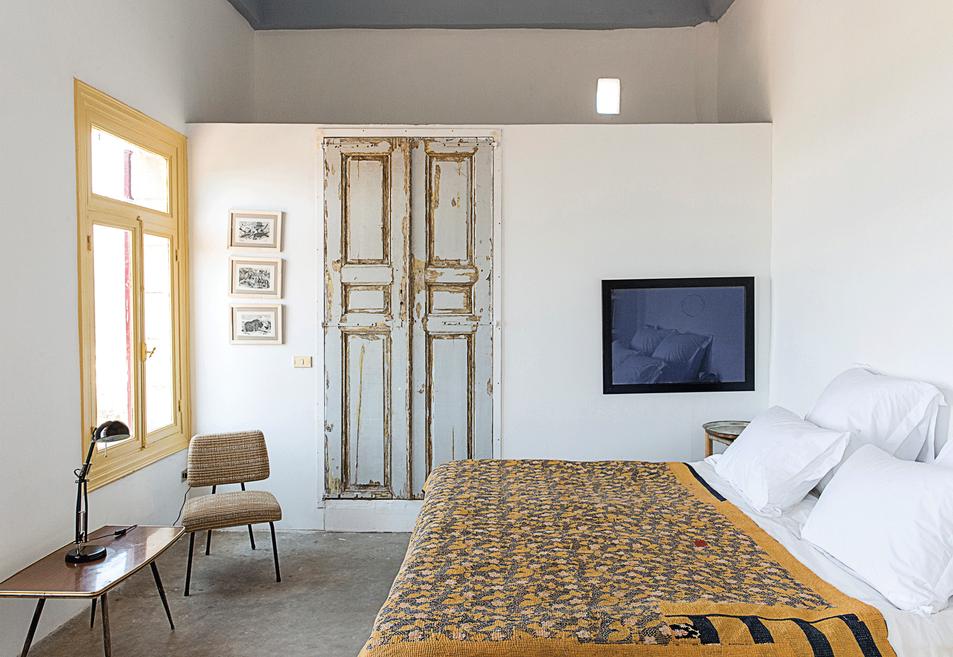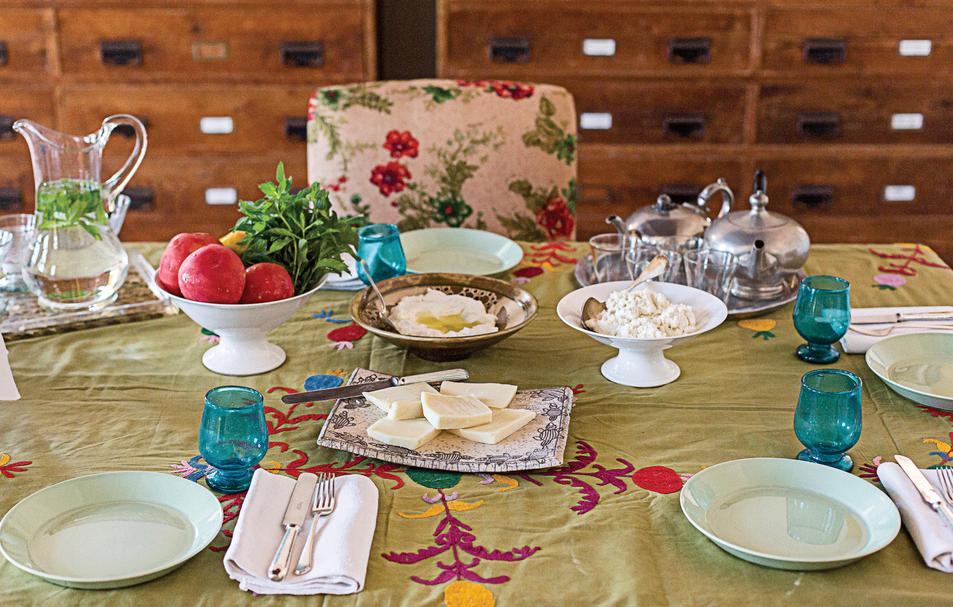

By Tarajia Morrell
IN 2004, Kamal Mouzawak, a former food and travel writer, launched Souk el Tayeb—Lebanon’s first farmers’ market—with the goal of celebrating small producers, fostering a model of sustainable agriculture and helping unite a divided country. Every Saturday morning in downtown Beirut, a neighborhood that’s home to shops like Hermès and Gucci, makeshift stalls fill the streets and 100 farmers lay out their wares. Amid Lebanon’s clash of cultures, religions and classes, the market demonstrates Mouzawak’s campaign to cultivate good food, make it available in a bustling metropolis and sell it at a fair price. Now, over a decade since he founded Souk el Tayeb, Mouzawak has expanded his influence with the launch of Beit Douma, a guest house with an eye toward architectural preservation.
Mouzawak’s identity as a social entrepreneur started to take shape just after the culmination of the Lebanese civil war (1975–1990). In 1991, while working for Art et Culture, a nonprofit organization with an open-door policy that fostered creativity, Mouzawak identified a desire for solidarity. “People who were supposed to be enemies of each other started to flow into this place, and I understood the importance of having a common ground for people so that they can look for similarities beyond differences,” Mouzawak remembers. “That is what Souk el Tayeb is about—how to bring people together, how to make food, not war.”
Eager to better acquaint himself with Lebanon, which had been partitioned by war for most of his youth, Mouzawak toured the country and wrote about its food and farming—the common threads that connect every corner of the tumultuous but fertile nation. His interest in macrobiotics and the Slow Food movement followed, and in 2004, he was asked to oversee the food portion of the first Beirut Garden Show. Mouzawak gathered 10 farmers for the show, and this initial group would form Souk el Tayeb.
Since its inception, Souk el Tayeb (or “market of good”) has grown into an organization that aids farmers in organic certification, offers cooking classes, creates food-education programming for youth and organizes festivals to celebrate local traditions. The most acclaimed of Mouzawak’s culinary triumphs is Tawlet (“table” in Arabic), the farmers’ kitchen launched in 2009, where each day a different nonprofessional cook creates a menu that aims to tell the story of their region through food.
Tawlet offers an array of authentic dishes: bowls of tabbouleh and cold mezze (Lebanese small plates); fragrant salads of herbs, beans and eggplant; raw kibbeh (meat and bulgur tartare patties); hot mezze, such as fried kibbeh and kofte (meatballs); and an assortment of grilled meats and fish. Various Lebanese sweets, fresh fruits and coffee round out the buffet menu. The cooks serve patrons directly, encouraging dialogue about the food and its origin. For $27, Tawlet, which was No. 8 on Monocle’s 2015 list of top 50 restaurants worldwide, offers its patrons an opportunity to experience tastes from every part of the varied country without leaving its Mar Mikhael neighborhood in Beirut. Products from the farmers’ market are also sold under the label Dekenet, creating a market value for the farmers’ merchandise.
In 2011, Mouzawak was invited to speak at the MAD symposium in Copenhagen, the food conference co-founded by chef René Redzepi of Noma. And in 2013, Mouzawak returned with a team of 20 women (all participants in Souk el Tayeb and Tawlet) to serve lunch to the 600 festival attendees, which included some of the most distinguished chefs and foodies in the world. The women—Druze, Shiite, Sunni, Maronite, Greek Orthodox, Jewish, Palestinian and Armenian—represented a cross section of Lebanon, and for many it was their first time outside of the country. “He’s connected all parts of Lebanon,” says Suzanne Douaihy, a Maronite woman from northern Lebanon near Tripoli who has worked with Mouzawak for 11 years. “He changed everything in our lives. We had no work before we met him. We’ve met so many people from all over the country and world through Tawlet.”
In July, with the launch of Beit Douma (beit means home), Mouzawak broadened his ventures. Fifty miles north of Beirut in the Batroun mountains, Mouzawak and his partner, the accomplished womenswear designer Rabih Kayrouz, negotiated a 20-year lease on a traditional 18th-century hillside house in the ancient town of Douma. When they signed the lease last spring, the building was in complete disrepair, as are most of the country’s older structures. The couple invested in restoring and modernizing the house while maintaining its original integrity. For $150 per night, it’s an attractive option to both Beirut residents and tourists. “It’s not a business hotel. It’s a home,” Mouzawak explains. “People cannot afford to have homes like this anymore, so these are different homes where you can come have a room or the whole house—alone, as a couple or as a family.”
Mouzawak and Kayrouz have filled the home with antiques and modern accents. A vintage fuchsia Uzbek suzani—an embroidered textile used here as a tablecloth—welcomes guests in the entranceway; old woven plastic industrial sacks embroidered by Syrian artisans are repurposed as vibrant throw pillows. Outside the Beit kitchen, Mona El Dorr, a baker whom Mouzawak has championed at Souk el Tayeb and who specializes in manakeesh—the Levantine Arabic baked dough topped with herbs, cheese or ground meat—built a traditional mud oven, a dying art form lost to technology. At a party to “baptize” the house, El Dorr proudly presides over her kiln, drawing out fragrant mini manakeesh and handing them to guests. “It’s about preserving a national identity mainly through cuisine: The expression that we have here through the food that we eat,” says Mouzawak. “But also through architecture—how to preserve the wealth that we have; and this is the wealth that we have, not stocks or petrol oil.”
Raghida Dergham, senior diplomatic correspondent for Al Hayat, the international Arabic daily newspaper, expounded on the couple’s achievements: “They not only create beauty for us to enjoy, but they always bring in the farmer, the planter, the woman who cooks and give them confidence and teach them how to protect their rights.” The appreciation is equally evident as Mouzawak walks through the weekly street market in Beirut—every vendor embraces him and offers him a plate of food.
Despite the success of Souk el Tayeb and Tawlet (which has three other outposts in Lebanon) as well as the launch of Beit Douma, Mouzawak is quick to say that there is more work to be done: “When one has power, money or recognition, it is not about how to get more—but how to give more and make a change with what life gave you.”
In September, Mouzawak released Lebanese Home Cooking, a collection of mostly vegetarian recipes, as a homage to food’s capacity to surpass cultural divides. “You just cook!” Mouzawak writes in the introduction, “…because you can communicate love and caring through a bite.”



